Student Travel Stories
Kathryn Vivirito Bio
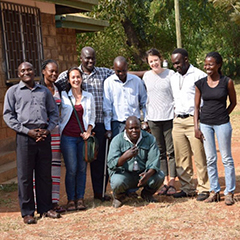
Kathryn Vivirito, MPH in Epidemiology student, completed her practicum in western Kenya with the Kenya Medical Research Institute on a One Health program. The program focuses on the connection between human and livestock health within rural communities in western Kenya and offers free medical care for families and their livestock in the study. Kathryn was a recipient of the Douglas Passaro scholarship.
Q and A with Kathryn Vivirito
About Kathryn's fieldwork
1. What about the Global Health Program at UIC made its greatest impact on you?
The connections that I have made while at UIC are some which I hope to maintain throughout my future career. Many professors have extensive global health experience and are more than willing to mentor students and help navigate the program. Learning about the work that professors at UIC have accomplished abroad is both inspiring and humbling, and I hope to apply everything I have learned from them throughout my career.
2. In what ways did you prepare for your global practicum?
I think the most important preparation I did was to talk with second year students who had also gone abroad for their practicum. The were very honest about what to expect (and what not to expect). Learning as much as I could about the project and culture beforehand was also very helpful.
3. What was the most valuable thing you learned through your global professional experience?
Learning how to adapt in different settings and be resourceful when in the field was a great learning experience for me. However, I think the most important thing I learned was the importance of clear communication and expectations when working with projects both abroad and here in the U.S.
4. How did this experience prepare you for work in public health?
I learned a lot about project implementation and working in a developing country. Working with livestock in rural Kenya offered invaluable insight into the importance of One Health and the major obstacles faced.
5. How did your perspectives or worldview change as a result of this experience?
My experience abroad allowed me to take a step back from the classroom setting of global health and apply what I had learned in real life. Until I was able to apply my knowledge and witness what we had learned about first hand, I did not have a full grasp of the challenges of international public health work.
6. In what ways did this experience enhance or change your career goals?
My experience abroad solidified my desire to work on One Health projects in developing countries. I plan to use this experience to tailor my veterinary career and maintain a strong interest in global One Health experiences.
7. What advice would you give to current global health students?
When searching for a practicum, be sure to keep your options open and start early. Utilize the connections that UIC has to offer to find an opportunity that fits you. While abroad, remain flexible and adaptive. Few practicums go as smoothly as planned, but remember to get the most out of your time abroad- it goes faster than you think!
Ariel Trocino Bio
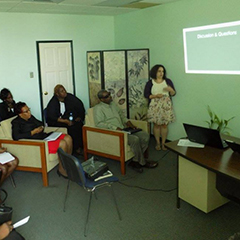
Ariel Trocino, MPH in Health Policy and Administration student, worked with the Ministry of Housing and Social Development in Grenada, honing her skill set in addressing global public policy challenges.
Q and A with Ariel Trocino
About Ariel's fieldwork
Ariel was grateful to receive funding from the UIC Global Health Program, and she self-funded the remainder of the practicum. She was interested in continuing her experience in Grenada after accompanying a group of School of Public Health MPH students to do work with the Ministry in Grenada during spring break.
1. What was the most valuable thing you learned through your global professional experience?
While there are many things I learned about applying public health principles on the ground while in Grenada, perhaps the thing I learned most was flexibility and adaptiveness. International work requires good listening, thoughtful engagement of stakeholders and the ability to change course at the drop of a hat. If I had expected the same working environment I had in corporate America, my experience would have been far less rich and rewarding. Being flexible on the ground while working in international health is an excellent skill I am glad I learned while in Grenada.
2. How did this experience prepare you for work in public health?
Working in Grenada gave me the confidence to believe I can be a public health professional. Though I have been out of school and working for many years, public health was a career change for me. Before arriving in Grenada, I did not consider myself all that knowledgeable and skilled. Working with the Ministry and the people of Grenada made me understand that I am bringing a specialized skill set and framework to public policy challenges, and I have something important to offer in any room.
3. How did your perspectives or worldview change as a result of this experience?
Working abroad helped me realize that the world is much smaller than it feels when you stay in one place for a long time. I have traveled in the States, but living abroad for the summer helped me understand that I am capable of being flexible and adapting to new cultures and environments. An important part of this understanding is learning that wherever you go, people are friendly and kind, and we all want the same things. The world feels significantly smaller and less unknowable because of my experience in Grenada.
4. In what way did this experience enhance or change your career goals?
Prior to going to Grenada, I did not plan to consider policy positions that had an international or global focus. I feel I have broadened the job opportunities open to me because of my international experience.
5. What advice would you give to current global health students?
My advice would be to remain flexible about where your practicum may take you and advocate for yourself. There are so many professors in all the divisions that have global experience; email them or stop by their offices and ask for a meeting. Talk to everyone you can about wanting to go abroad and what practicums may be a good fit for you. There are so many connections to be made and experiences to have!
Noreen Sarhene Bio

Noreen Sarhene, MPH in Health Policy Administration and MBA student, completed her practicum in 2016 with IMA World Health, a non-governmental organization in Washington, D.C. that offers sustainable and efficient solutions to health-related problems, including providing medical supplies, fighting diseases and strengthening health systems and women’s empowerment.
Q and A with Noreen Sarhene
About Noreen's fieldwork
Noreen was hired as a Business Development Intern with IMA World Health, and this was a paid experience. Noreen was interested in working in the headquarters of a NGO because she aspires to work behind the scenes in a managerial/operational role while providing ground support when needed in a global health context.
Noreen’s term at IMA provided her extensive experience in the proposal acquisition process and the associated regulations and guidelines. In this position, she was integral in the organization of the proposal process and interpreting and communicating proposal requirements to ensure compliance with external consortia and consultants in order to fulfill donor requirements. Additionally, she had the responsibility of backing partner development and management efforts. With regards to the organization of the proposal, Noreen was tasked with duties such as formatting CVs, conducting background research to determine the practicality of pursuing upcoming opportunities and collecting the necessary proposal components from different departments in order to submit a final product.
1. What was the most valuable thing you learned through your global professional experience?
The most valuable thing I learned was how the entire global health field works. I obtained a greater understanding of the players in the game and the role that each player plays. I gained a better understanding of how I could formulate and combine my skills to prepare for a career in global health. Lastly, I learned where I could use my strengths to make the greatest impact on communities abroad.
2. How did this experience prepare you for work in public health?
This experience prepared me for work in public health by helping me to understand what kind of organization I wanted to work for and what I ideally would like to do within that organization that best complemented my strengths. It also allowed me to understand my gaps in knowledge and how to best mitigate these gaps by either improving on certain skills, increasing my knowledge base or networking with professionals in the positions I saw myself in.
3. How did your perspectives or worldview change as a result of this experience?
I realized that we live in a globalized world whether we choose to see it or not; even aspects of the world that are seemingly unrelated to the U.S. effect the U.S. and its stakeholders and it is in our best interest to keep America as an integral participant in global health. I no longer believe that there is a disassociation between public health and global health. Global health embodies the essence of public health, primary prevention. By assisting developing countries today we are preventing mass disasters tomorrow.
4. What advice would you give to current global health students?
The advice I would give to future global health students is to take every opportunity to learn everything and network with people in the field. It is okay that you do not know everything in the moment but, if you continue to be curious and engaged you will learn everything you need to to be successful. Be sure to soak up as many skills and knowledge as possible so you will not walk into a situation ignorant; however, be assured that it is okay if you stumble and fall from time to time. Patience, perseverance and determination will take you a long way.
Richard Peyton Bio
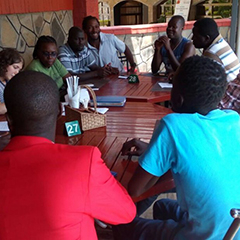
Richard Peyton, MPH in Maternal and Child Health student, worked as the recruitment and retention liaison and programs director at Anza Mapema, a study under the Nyanza Reproductive Health Society, in Kisumu, Kenya. Anza Mapema, which loosely translates to Early Start, is a program that aimed to recruit 700 men who have sex with men for participation in an HIV prevention/treatment program.
Q and A with Richard Peyton
About Richard's fieldwork
Richard’s fieldwork was assisted by generous funding from the UIC Maternal and Child Health Center of Excellence and through participation in the School of Public Health’s Kenya Program, which provided room and boarding with a host family.
What about the Global Health Program at UIC made its greatest impact on you?
Having access to leaders in their respective fields made it easy to choose UIC and the Global Health program. Because of those global connections, I was placed in Kenya for the summer, and additionally, I was able to pursue research that is relevant to populations that align with my research interest.
1. What was the most valuable thing you learned through your global professional experience?
I learned that Pubic Health really is everywhere. In the School of Public Health, we teach Health in All Policies, but seeing this in action, on a global scale was a great experience. On one of the beaches in Kisumu, there is a weekly beach party. Seeing Health Advocates at the party talking, mingling and handing out condoms and lubricants, was a great interplay of community based health.
2. How did your perspectives or worldview change as a result of this experience?
I have traveled extensively around the world and as such, I would not say that my worldview changed. However, my worldview was re-enforced by witnessing the cask systems that exist even in poorer communities abroad. There is a lot of work that needs to be done to bring equity to the world. I’m excited to continue on this path.
3. In what way did this experience enhance or change your career goals?
I was originally a bit hesitant about this opportunity because I did not think that working with the MSM community aligned with my MCH concentration. However, I was able to see the impact of marginalized populations regardless of sexuality or gender identification. This has led me to look more broadly at upcoming employment opportunities. Instead of looking for a pure maternal health job, I know that by working in family health, marginalized communities, or other aspects of community health, will still have a lasting impact on maternal health.
4. What advice would you give to current global health students?
Strike out and try something new. As I’d mentioned, I did not think this experience would fully align with my career and education goals. However, getting on the ground, I found a way to link this experience to my education goals. Additionally, you never really know when another chance will come to do something amazing.
Mary Otoo Bio
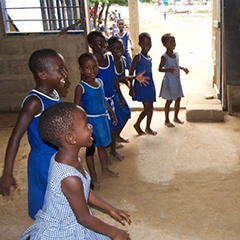
Mary Otoo, MPH in Epidemiology and Biostatistics student, worked with an organization called Unite For Sight to provided free vision care and eye restoring surgeries for residents in rural Ghana in 2016. Her responsibilities on the field included recording patient information, performing visual acuity tests, dispensing medication and eyeglasses as prescribed by the local doctors, and coordinating referrals for surgeries.
Q and A with Mary Otoo
About Mary's fieldwork
Mary worked with an organization called Unite For Sight to provided free vision care and eye restoring surgeries for residents in rural Ghana. Her responsibilities on the field included recording patient information, performing visual acuity tests, dispensing medication and eyeglasses as prescribed by the local doctors, and coordinating referrals for surgeries. In addition to these, she used a tool provided by UFS to survey mothers and explored the association between maternal perceptions of child eye problems and non-receipt of eye care in the life of their children.
A previous student had told Mary about her volunteer work with UFS in Ghana which got her interested in volunteering but she never had found the opportunity to do it. The MPH practicum requirement provided Mary the opportunity to do something that she had been interested in while satisfying her requirements for school. Mary was also eligible to apply for scholarships to fund her experience.
1. In what ways did you prepare for your global practicum?
I learned and familiarized myself with the language and culture of some of the communities I was going to work in. These helped me to be mindful of pitfalls and avoid being too intrusive when I surveyed patients for my study. I also shadowed and trained with doctors for skills that enabled me to effectively assist with work on the site. Unite for Sight courses also provided the necessary background information to understand and recognize various eye diseases.
2. What was the most valuable thing you learned through your global professional experience?
I learned about the importance of sustaining programs so that impacts are maximized over a long period of time and not just at an instant or short time frame. Secondly, I learned that to ensure the continued success of a program, it is utterly important to involve the community e.g. local doctors in planning and decision-making. Lastly, results of any research performed in a community should be communicated back to the community for their benefit and improvement.
3. How did this experience prepare you for work in public health?
This experience provided the opportunity to apply skills essential for a career in public health. Through my research, I was able to attain IRB approval, apply survey techniques in collecting data on the site, employ epidemiological methods in analyzing collected data and disseminate results of my study through oral and poster presentations at conferences. Additionally, my practicum exposed me to the realities of health care delivery in resource-limited environments. I learned how to make do with limited resources and effectively deliver healthcare services amidst language and cultural barriers. I learned how complex global health problems are managed using financial and human resources.
4. How did your perspectives or worldview change as a result of this experience?
The crowds of varying ages who attended UFS outreaches each day was baffling. This made the extent of vision problems evident and further emphasized the need for eye care in Ghanaian communities. I was impressed by how local doctors worked around the clock to care for patients. They worked until the last patient had been seen during outreaches and some surgery days went on until about 11pm, when over 50 patients, some bilateral, had received cataracts surgeries. This was amazing! I was also impressed with the community effort in keeping UFS outreach programs sustainable. I had previously wondered, “What are they doing to help themselves” and was happy to have witnessed a whole team working to reduce the global burden of blindness and vision impairment.
5. In what ways did this experience enhance or change your career goals?
My practicum experience definitely gave me the feeling of being part of something meaningful and has reinforced my interests in global health, public health, and vision health. This is because I got hands-on experience in applying public health principles to blindness prevention in a global setting The impact of cataracts surgeries was almost immediate that along with patients, I could appreciate the outcome. The best part for me was to witness patients look around as if it was their first time seeing and grateful for the gift of sight.
Nicole Laramee Bio
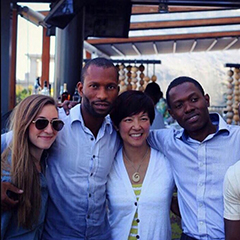
Nicole Laramee, MS Health Policy and Administration student, completed her fieldwork in Port-au-Prince, Haiti in 2016, building a sustainable business scale-up model for a neighborhood-based disaster risk reduction program created by several UIC colleges and implemented in Haiti in 2012. Jenny was also a recipient of the Douglas Passaro scholarship.
Q and A with Nicole Laramee
About Nicole's fieldwork
Nicole traveled to Port-au-Prince, Haiti during the summer of 2016 to complete her university field practicum. Nicole’s main task, along with the help of a colleague from the University of Illinois and Chicago’s Liautaud Graduate School of Business, was to find a sustainable business scale-up model for a neighborhood-based disaster risk reduction (DRR) program that had begun its work in Haiti in 2012 – a collaboration of the University of Illinois at Chicago (UIC) School of Public Health, College of Business Administration, College of Medicine, and Center for Global Health.
Nicole was able to learn how to create a project plan and lead the conduction of an in-country partner assessment, the creation of formal business proposals, and the execution of multiple business presentations. She was also able to learn how to use differences in both culture and expertise in advantageous, efficient, and effective ways; learn the basics of the Haitian Creole language; and observe the conduction of a one-week community disaster risk reduction (DRR) training lead by GTRRID (Gwoup kap Travay pou Rediksyon Risk ak Dezas), UIC’s local, in-country disaster risk reduction training partners.
1. What about the Global Health Program at UIC made its greatest impact on you?
The Global Public Health Challenges course (IPHS 409) was a great course that provided me a solid foundation in both past and present global health issues while also challenging many of my preconceived notions about global public health and what it really means to be culturally competent and meaningfully involved in global health work.
2. In what ways did you prepare for your global practicum?
I did a lot of reading on Haiti in an attempt to gain proper insight into and context of Haiti’s complex (and honestly quite tragic) history and the factors responsible for where the country is and how it is functioning today. Mountains Beyond Mountains, The Uses of Haiti, and Farewell, Fred Voodoo are some great ones. I would also recommend to anyone either thinking about or preparing for global health work to read any article(s) by Paul Farmer in relation to poverty and global health, such as “Social Scientists and The New Tuberculosis” – he does a great job of relaying the important differences between the effects of poverty (as well as other large scale structural factors) and those of culture (and therefore cultural competence) and the trouble that results from mistaking the effects of one for those of the other.
In addition to my background reading, I also took some time to learn the basics of French, one of two main languages spoken in Haiti and one of the languages by which Haitian Creole (the other main language spoken in Haiti) was heavily influenced. I also had the good fortune of being able to travel to Haiti on multiple occasions with my preceptor and architect behind the project, Dr. Janet Lin, to get my “feet wet” in certain aspects of the project and to meet those involved.
3. How did this experience prepare you for work in public health?
This experience allowed me to do just that – experience. It allowed me to really envelop myself in the culture and the context in which policy and business happen in-country and my colleague and I’s efforts were made more fruitful because of it. You cannot truly begin to understand a nation, nor develop sustainable programs that seek to improve the status quo, until you’ve experienced first-hand what that status quo is. An understanding of this will make me a more adept and effective health policy analyst.
4. In what ways did this experience enhance or change your career goals?
While I have numerous professional goals and interests that I would like to pursue within my lifetime, the goal which I am most passionate about and the one which I am most dedicated to both pursue and accomplish is that of writing global public health policies that will get better health care access, treatment, and education to resource-poor nations. My experience in Haiti has, without question, influenced this goal for the better by confirming my passion for global health work, enhancing my leadership capabilities, and by providing me with an increased sense of cross-cultural understanding and humility that I could not have acquired back home.
5. What advice would you give to current global health students?
If you are on the fence about doing your field practicum abroad – do it! An experience in global health will equip you with skills that are simply not possible to acquire domestically. And be flexible! Tis the nature of global health work for plans to change and change often – be able to roll with the punches. Flexibility is a great skill to have and something good will always come out of it!
Jenny Guadamuz Bio
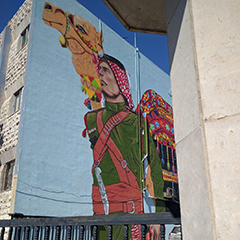
Jenny Guadamuz, MS Health Policy and Administration student, traveled to Amman, Jordan in 2016 to intern with the United Nations Relief and Works Agency, where she performed a field study to gather information in the use of antihypertensive medications and hypertension control among Palestine refugees in Jordan. Jenny was also a recipient of the Douglas Passaro scholarship.
Q and A with Jenny Guadamuz
Jenny Guadamuz's fieldwork experiences
During her time at the School of Public Health, Jenny was involved in research of medicines to prevent and treat chronic illness with Dr. Dima Qato from the Department of Pharmacy Systems, Outcomes, and Policy at the College of Pharmacy. Dr. Qato recommended Jenny for this position and supervised her research project.
1. In what ways did you prepare for your global practicum?
Before I left for Amman I tried to learn as much as I could about the Jordanian culture. Expats can save a lot of headaches if they can avoid the most common faux pas. This being said, culture shock will always occur when you’re in a new culture. Thankfully, Jordanians are among the kindest people one could meet. Colleagues, neighbors, and even strangers all helped me navigate Amman; both physically and socially. The most important thing is to be open to the help your new community is eager share! (Most are also eager to learn about Americans.)
2. What was the most valuable thing you learned through your global professional experience?
As cliché as this might sound, the most valuable thing I learned during my experience was to be open. Open to what? Help, criticism, and differing perspectives. I spent weeks studying the UNRWA health delivery system. But within a week in Amman I had a completely different and deeper understanding about the strengths and weaknesses of the system. I even had to redesign my proposed study given the on the ground realities. I could only have gained that knowledge by listening with an open mind.
3. What advice would you give to current global health students?
Find a good advisor. I met Dr. Qato in 2015, after I took her class because I thought her research was interesting. She saw that I had a true passion about health equity and equitable access to medications and she helped me gain research experience with her and always has new ideas about how I can improve as a student and researcher. Her network even helped me get the internship in UNRWA. A good advisor is invaluable for all global health students.
Sayuri Fujita Bio
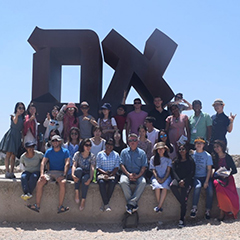
Sayuri Fujita, MPH Health Policy and Administration student, traveled to Tel Aviv, Israel during the summer of 2017 to participate in a global health course and Applied Practice Experience at Ben Gurion University of the Negev.
Q and A with Sayuri Fujita
Sayuri Fujita's thoughts on the fieldwork experience
1. In what ways did you prepare for your global health practicum in Israel?
During my global health practicum preparation, I got in touch with my Practicum advisor to prepare my participation in the practicum experience. I acted in accordance with the rules, regulations, and professional standards of our University, Ben-Gurion University, the partner institution in Israel, and the field practicum site. I made sure I followed up with Alyson and Erin, coordinators of the Global Health Program at UIC, my academic advisor, registrar’s office, and financial aid office. I made sure I filled out all the necessary paperwork and turned it to the coordinators of the academic institutions, my academic advisor, financial aid adviser, and the consular officers. Lastly, I made sure I had enough funds to support me during my time abroad.
2. What was the most valuable thing you learned through your global health professional experience?
Overall, the most valuable thing I have learned throughout my global health professional experience is to always stay true to myself, follow my passion, and always remember to care about others and the environment. I learned a lot more about myself abroad because of the unique space in which I learned, experienced, and time spent exploring another culture. I was able to examine my worldview and it challenged any assumptions about myself and others.
3. What advice would you give to current global health students?
My advice to current global health students is to take the opportunity to study, work, live, do research in a cross-cultural environment, and be able to contribute meaningfully to real-world needs through community service-learning. Taking an opportunity to go abroad allows students to come across unexpected adventures and enables students to rely on their social skills and knowledge. Students are allowed to choose and decide their own field practicum experience based on their ability and skills. Supervisors, who serve as hosts, assign roles based on student’s’ aptitude and readiness, and they help develop and coordinate types of fieldwork placements for students.
4. How did your perspective or worldview change as a result of this experience?
My global health and field practicum work abroad has heightened my worldview, mainly because I was able to make sense of the country’s history, culture, traditions from my own eyes and from my own experiences. I was able to fulfill so much more understanding about the people’s health, well-being, and livelihood, including their deep history and cultural diversity. Being abroad reinforced my worldview and I was able to fully grasp that we are all different, yet we are all different, as we come from different backgrounds and experience different hardships. I have learned to embrace and appreciate the differences of others and encourage others to thrive, leading us to a more understanding of rich cultural society.
5. In what ways did this experience enhance or change your career goals?
My global health study and field practicum work in Israel has truly enhanced my personal growth, skills, and experiences. My experience abroad enhanced my career goals because I am willing to follow a path towards a career in global health whether it may be at a national or international level in international development, philanthropy, humanitarian aid, or diplomacy.
Meghna Nagam Bio
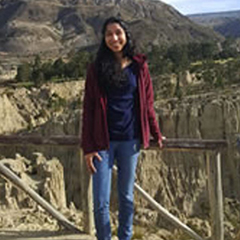
Meghna Nagam, MPH Community Health Sciences student, completed her fieldwork teaching sexual reproductive health classes in Bolivia, solidifying her desire to pursue a career in global health, including enrolling in the UIC’s College of Medicine’s Global Medicine program.
Q and A with Meghna Nagam
Meghna Nagam's thoughts on her experiences
1. What about the Global Health Program at UIC has made its greatest impact on you?
Being able to work with students and faculty who are extremely dedicated to global health and having the space to be able to talk about worldwide health disparities and strengths has been my favorite part of UIC’s Global Health Program. Whether it was through the Global Health Solutions class or International Night, the community I joined here has had the greatest impact on me.
2. In what ways did you prepare for your global health international experience?
Since I was going to being spending 6 weeks in Bolivia, I spent a lot of time practicing my Spanish speaking skills and brushing up on medical vocabulary because I was teaching sexual reproductive health classes. I also prepared for the designing and evaluation parts of my practicum by going through the readings and assignments that I completed through my community health sciences curriculum to begin creating a list of sources that I could easily access during my time abroad.
3. What was the most valuable thing you learned through your global professional experience?
I think the necessity of being flexible when it comes to public health work was the most valuable thing I learned through my global professional experience. No matter how much planning goes into a program, there’s always the chance that you won’t have the materials you need or even the turnout you expected for a program. Learning how to quickly adapt to these situations while still valuing the community and culture you are working with is extremely important for ensuring long-term success of a public health intervention.
4. What advice would you give to current global health students?
Keep in mind that a project you want to pursue is not necessarily what the community actually needs. I would advise current global health students to be open minded with what health areas or geographical locations they want to work with. Even if a project isn’t 100% what you originally planned on working on, the ability to apply what you have learned through your public health coursework in a real-life setting is an incomparable experience.
5. How did your perspectives or worldview change as a result of this experience?
Teaching sexual education classes was something I had done in America before, but I assumed it would be vastly different in Bolivia. While there were definitely cultural and societal differences, there were also a lot of similarities in the questions students asked, topics they wanted to learn more about, and areas that made them uncomfortable. This really opened up my eyes to how despite being in different hemispheres, teenagers in Bolivia and the United States shared a lot more in common, especially in relation to their sexual health, than I originally thought.
6. In what ways did this experience enhance or change your career goals?
This experience truly solidified my goals of being a public health practitioner in a global setting. Because of the Global Health Program and my experience abroad, I decided to join UIC’s College of Medicine’s Global Medicine program and train to become a physician who is also focused on tackling global health disparities.
Sara Stokes bio
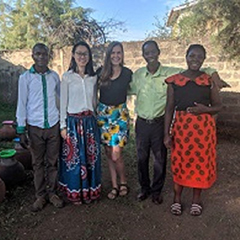
Sara Stokes completed her fieldwork in Kisumu, Kenya, where she learned about overcoming public health challenges that surface at the global level and how local culture influenced the environment she worked in.
Q and A with Sara Stokes
Sara Stokes' Thoughts on her Global Health Experience
1. What about the Global Health Program at UIC has made its greatest impact on you?
The greatest impact that the Global Health Program has had on me was the ability to participate in the Kenya program this past summer. Through this opportunity I was able to fully realize my passion for global health and the impact that I can have in this field.
2. In what ways did you prepare for your global health international experience?
I did a few different things to prepare for my experience in Kenya. I explored the culture and what languages they speak. I also did research on their political environment to see what was happening currently and in the past and how it has shaped the city.
3. What was the most valuable thing you learned through your global professional experience?
The most valuable thing that I learned was how to overcome challenges that sometime present themselves while working on a global scale. Things that we take for granted here in the US such as getting supplies can become a month-long process in another country. I also learned about how local culture influence the environment you work in as well.
4. What advice would you give to current global health students?
I would tell them to take advantage of all the opportunities that the global health program offers. I would have never gone to Kenya and been able to travel around to surrounding countries had it not been for the Kenya program.
5. How did your perspectives or worldview change as a result of this experience?
My worldview has changed drastically from going to Kenya. I have realized that different is not so scary. There is so much to learn about the rest of the world and if you only take what you hear in the news and take it as absolute truth then you are missing out on valuable cultural experiences and overall understanding.
6. In what ways did this experience enhance or change your career goals?
This experience enhanced my goals of working in a more global arena. I have realized how I can work in another country without necessarily having to live there full time which can be a bit intimidating. I also learned about the multitude of NGOs that operate on a global scale and was able to learn more about those organizations.
7. What advice would you give to current global health students?
I would tell them to take advantage of all the opportunities that the global health program offers. I would have never gone to Kenya and been able to travel around to surrounding countries had it not been for the Kenya program.
Carrie Nacht Bio
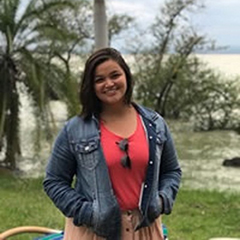
Carrie Nacht, MPH in Epidemiology student, completed her field practicum in Kisumu, Kenya during summer 2018, during which she realized that she wanted to pursue a career in international epidemiological research. She says she benefited from her experience by improving her quantitative analysis skills and learning new statistical analysis.
About Carrie Nacht's global health experience in Kenya
About Carrie Nacht's practicum experience
1. What about the Global Health Program at UIC has made its greatest impact on you?
The Global Health Program is impactful because the courses that you take are very insightful on everything that you do in your global professional experience. It helps “set the scene” for what global work entails.
2. In what ways did you prepare for your global health international experience?
Talking to previous students who have done this field practicum gave a lot of insight, even after doing a lot of searching the internet for things to pack, what to wear, etc. Hearing someone’s perspective who has gone through the same thing is really crucial.
3. What was the most valuable thing you learned through your global professional experience?
The global professional experience provided me something that I wouldn’t have been able to discover without enrolling at UIC: what I want to do with my life! I figured this out while pursuing my field practicum in Kisumu, Kenya this summer, which is where I realized that I want to do international epidemiological research for my future career. Being in that setting and seeing this research being conducted firsthand made me realize that there isn’t anything I’d rather do!
4. How did your perspectives or worldview change as a result of this experience?
Every time I go to another state, country, or continent my perspective changes. And I actively try to pause during daily activities and look at my perspective, whether it be a regular Tuesday during a semester at UIC, or during my global experience. As Marcel Proust once said, “The real voyage of discovery consists not in seeking new landscapes, but in having new eyes.”
5. In what ways did this experience enhance or change your career goals?
This is a really good professional experience for me because I could improve my quantitative analysis skills and I learned a new statistical analysis software. Additionally I got to observe all aspects of global research, including field work, collaboration, data work, and lab work.
6. What advice would you give to current global health students?
Reach out to people you are interested in working with for your practicum early and often.
Celina Garza Bio
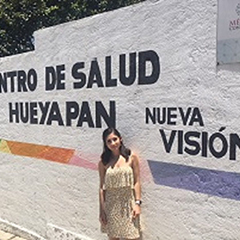
Celina Garza, MPH in Community Health Sciences student, traveled to Mexico and researched Mexico’s health care system, where she found many of the public health challenges in the US are also present in other countries, calling for great flexibility in public health practice.
Celina Garza Interview
About Celina Garza's trip to Mexico
1. What about the Global Health Program at UIC has made its greatest impact on you?
Through the Global Health Program I have been able to take classes that I otherwise may not have taken and challenges me to look at public health outside of the Chicago and US bubble. Through my courses I have been able to meet students from various backgrounds and expertise areas. For example, through my global health elective course I have met students from the Human Development and Disability department and it has been such an enriching experience learning from their perspectives. Additionally, through the Global Health Program I was more intentional about my field experience, ultimately having the opportunity to complete it at the National Institute of Public Health in Mexico.
2. In what ways did you prepare for your global health international experience?
In preparation for my international experience I researched Mexico’s health care system and my preceptor’s research topic areas. Additionally, I tapped into my peers and met with student’s that had previously done their field experience at INSP.
3. What was the most valuable thing you learned through your global professional experience?
Through my professional global health experience I learned that many of the issues we face here in the US are also present in other countries and that is extremely important to be flexible in doing public health work. Regardless of where you are, it is always important to consider the communities priorities and acknowledge their expertise and recommendations. I learned that I really enjoy being out in the community and having face time with community members. This is one aspect I will definitely look for when considering future professional opportunities.
4. What advice would you give to current global health students?
It is really important to do your research on possible field experience opportunities early on because some programs may have limited space for students or have early deadlines in January or February. I would also encourage global health students to look for their global health elective course outside of SPH, it can be really refreshing to take a class that might be a little out of your comfort zone with new peers.
5. How did your perspectives or worldview change as a result of this experience?
From my experience, I gained a greater perspective on how challenging it really is to make sustainable change, and that just because you have people on your side, you may still need to overcome legal frameworks to get things done. I am glad that these challenges did present themselves during my field experience because I have a more realistic view on what actually needs to happen before change can happen.
6. In what ways did this experience enhance or change your career goals?
As mentioned before, this experience showed me that I really enjoy being out in the community and talking to community members. As a Community Health Sciences student that is interested in community based practitioner research, I knew this was the case, but this experience cemented that I do want to just work behind a desk. Additionally, this experience has also kept my interest in evaluation work alive as it was clear that there were many organizations working towards the same goal, but doing work in silos with limited evaluation data.
Karis Barker Bio
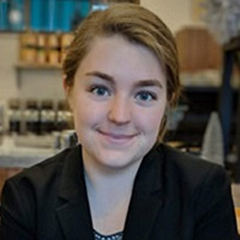
Karis Barker, MPH in Community Health Sciences student, traveled to Canada through the Global Health Program and completed her practicum experience with the Elizabeth Fry Society, where she confirmed her passion for addressing the public health disparities that marginalized ethnic and racial minorities face.
About Karis Barker's Global Experiences
About Karis Barker's practicum experience
1. What about the Global Health Program at UIC has made its greatest impact on you?
The Global Health Program at UIC has impacted me by challenging me to think about how I should apply public health frameworks and theories that I am learning in classes that are more locally/nationally focused to more global/international contexts.
2. In what ways did you prepare for your global health international experience?
When thinking about how I prepared for my global health international experience in Canada, my relatives were beyond generous in providing housing, food, and a bike for me to use during my practicum. I also had the advantage of completing my practicum in a country that I am pretty familiar with and whose language and culture are similar to mine here in Chicago. The biggest challenge was figuring out my bike route for commuting to the office and getting the best deal on a plane ticket to Calgary.
3. What was the most valuable thing you learned through your global professional experience?
Starting work at the Elizabeth Fry Society, I was self-conscious about my lack of practical experience working in a public health setting but I made the decision to approach the experience with a posture of humility and learning, which served me well. In short, I learned how to be a good learner, especially when it came to matters of Indigenous customs and traditions. Instead of trying to hide my ignorance or pretend that I knew more than I did, I took the opportunity to ask for context and guidance.
4. How did your perspectives or worldview change as a result of this experience?
My perspective changed as a result of my practicum experience primarily by increasing my awareness of Indigenous people. I learned about them in school but they remained a distant, abstract population until I worked with my Indigenous colleagues at the Elizabeth Fry Society. Knowing Indigenous people as individuals, as friends and co-workers with unique life-stories enhanced my understanding of their cultural heritage and history as well as my interest in learning more about the health disparities that Indigenous people endure.
5. In what ways did this experience enhance or change your career goals?
Working for the Elizabeth Fry Society of Calgary validated my interest in pursuing a career conducting research and evaluation. It also confirmed my passion for addressing the public health disparities that marginalized ethnic and racial minorities face. After learning about the intergenerational trauma that Indigenous people living in Canada experience, I have added this population to my mental list of potential research topics. My experience also compelled me to seriously consider pursuing a career in Canada.
6. What advice would you give to current global health students?
For the current global health students that are beginning to think about their practicum experience, I would implore them to start searching for opportunities as soon as possible. I started actively searching in January and didn’t have a promising option until April. Even still, the logistics were not settled until mid-May. Practicum applications were a source of immense stress for me and many of my peers, especially as we got closer to the deadlines.
The process of preparing for the practicum experience is long; it is important that you give yourself enough time to apply for and consider multiple options, including time for completing paperwork after deciding which option you will choose.
I also offer the advice of Vincent van Gogh: “I am always doing what I cannot do yet, in order to learn how to do it.” Don’t let lack of experience hold you back. As long as you demonstrate your willingness and desire to learn, I have found that people are equally willing to teach you, or at least guide you towards better understanding. This is particularly important in global health contexts.
Bruce Larkin Bio
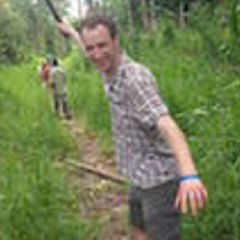
Bruce Larkin, MPH Epidemiology and Biostatistics ‘ 15, earned the MPH/MS scholarship, funding his practicum in Gabon during the summer of 2014. He partnering with a local NGO, VIH/SIDA et Espoir, to develop and implement a survey study on HIV stigma and HIV testing in Gabon. In addition to Bruce also took French classes and volunteered with OSPAC (L’oevre de Sante Primaire de L’Alliance Chretienne), a locally-run mobile clinic which provides health education and clinical care to remote villages.
Bruce Larkin's global health experiences
About Bruce's fieldwork
1. What about the Global Health Program at UIC made its greatest impact on you and how did it prepare you for a global practicum?
The Epidemiology of HIV/AIDS (EPID 409) was a great course which gave me a solid foundation in understanding HIV and current HIV interventions.
2. What was the most valuable thing you learned through your global professional experience?
Be humble when interacting with other cultures. It is impossible to make an impact in a foreign context without first learning how to think and live like those you are trying to reach.
3. How did this experience prepare you for work in public health?
There is no better way to learn than through experience. As a result of my trip, I am much more confident that I can lead a public health intervention and understand how public health interventions should be modified based on the cultural context of the intervention.
4. How did your perspectives or worldview change as a result of this experience?
As Americans, I think many of us believe the myth that the developing world needs our help. While in Gabon, I witnessed Gabonese nationals organizing together to make a tremendous impact in their community. I observed pharmacies, clinics, a diagnostic lab, and an orphanage all being operated with little to no western involvement. Further, local churches have partnered together to provide medical care, job training, and supplies such as wheelchairs and glasses to the disadvantaged. I was struck by the willingness of the local leaders to sacrificially assist those in need. The Gabonese are definitely concerned for their fellow nationals, and they are making a difference.
5. In what way did this experience enhance or change your career goals?
Performing my practicum in Gabon confirmed for me that I would enjoy a career in global health. Specifically, I would like to work in some capacity to equip and empower local NGOs providing public health and medical services to their fellow nationals.
6. What advice would you give to current global health students?
Plan ahead. It was a miracle that I was able to go on this trip given the number of obstacles I had to overcome. Finding the ideal NGO to work with, receiving ethics approval from a foreign IRB, and getting my visa were some of the many things which took much longer than I originally anticipated.
Micaella Verro Bio
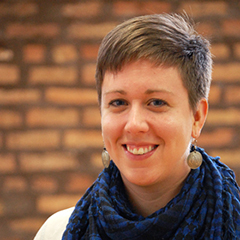
Micaella Verro, MPH in Community Health Sciences ’15, completed her practicum at the Instituo Nacional de Salud Publica in Cuernavaca, Mexico during the summer of 2014. Micaella worked under the mentorship of Dr. Rene Leyva Flores, the Director of the Unit of Migration and Health. She assisted in drafting research articles, conducted a literature review of faith-based organizations and their involvement in migrant human rights, performed an evaluation of a migrant shelter in Chiapas and interviewed Central American migrants about their experiences in transit through Mexico.
Micaella Verro's global health experiences
About Micaella's fieldwork
1. What about the Global Health Program at UIC made its greatest impact on you and how did it prepare you for a global practicum?
I did not start the Global Health Program until after completing the practicum. The Global Health Program has since helped me understand how foreigners and NGOs can be meaningfully involved in global health without undercutting local capabilities.
2. What was the most valuable thing you learned through your global professional experience?
It’s impossible to list just one or two things that I learned while working at INSP. While living abroad, even everyday occurrences are learning experiences (even a simple illness can teach you about the health system, for example). I also learned more about the Spanish language and Mexican culture, which are immensely valuable for my work locally. However, the most formative experience I had during the practicum was the two weeks I spent alone in Tapachula, Chiapas at a migrant shelter on the Guatemala-Mexico border. This experience forced me to be completely independent and immersed, and greatly deepened my understanding of the human rights issues facing migrants.
3. How did this experience prepare you for work in public health?
I plan to work in immigrant health and human rights, so my experience in Cuernavaca was very useful. I have a much deeper understanding of the Mexican culture, the violence and poverty that push people out of their countries of origin, and the ways that U.S. policies are implicated in migration. I have a new appreciation for the dedication and resilience of migrants, as well as a renewed calling to continue this work.
4. How did your perspectives or worldview change as a result of this experience?
I had spent several summers in Mexico before my practicum, but this experience gave me a new appreciation for the rich research being conducted in Latin America. I had a very United States-centric view of academia and research, and now realize that there is a lot of valuable research being done in other places. I had never worked in a formal 9-to-5 job while traveling before, so this experience was very different.
5. In what way did this experience enhance or change your career goals?
This practicum re-affirmed my commitment to work with the immigrants of Latino descent. However, before working at INSP, I wanted to work in obesity prevention and health promotion. After learning more about the human rights violations experienced by migrants, I have shifted my focus towards human rights and protection for migrants as they travel towards their destinations.
6. What advice would you give to current global health students?
Say “yes!” to any international experience that is offered to you!
Jessica Ruggiero Bio
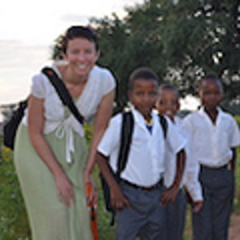
Jessica Ruggiero, MPH Community Health Sciences ’14, completed her practicum through the Peace Corps Master’s International Program and served as a Peace Corps youth development volunteer in Botswana September 2012 – October 2014. She helped to implement a life skills curriculum at the primary school where she worked, in particular focused on HIV education and risk reduction, general health and wellness education and preparing students for their future educational and life goals.
Jessica Ruggiero's global health experience
About Jessica's fieldwork
1. What was the most valuable thing you learned through your global professional experience?
I learned to believe in myself and to accomplish goals with few resources and minimal assistance from community counterparts.
2. How did this experience prepare you for work in public health?
It gave me the opportunity to put into practice the theories and skills I learned in the classroom. I learned the importance of creative thinking and flexibility and always having at least two back-up plans.
3. How did your perspectives or worldview change as a result of this experience?
My perspectives of the world will forever be altered. Primarily, I realized that however much time and interest I put into a new culture, I will never know every aspect of that culture. We must realize that we are outsiders. We may become close friends, and even included as family members, but the people from those places have an invaluable lifetimes’ worth of knowledge and experience that we will never have. I learned to trust in their intuitiveness and expertise.
4. In what way did this experience enhance or change your career goals?
I hadn’t really considered working in a global capacity until after I returned from Peace Corps, and those jobs seemed the most interesting and important to me. This experience will hopefully allow many new career opportunities for me, should I choose to work globally.
5. What advice would you give to current global health students?
Dive in! Find what you love and live it!
Adrienne Banks Bio
Adrienne Banks, MPH in Community Health Sciences ’14, received the Douglas Passaro Global Horizons Scholarship and traveled to Panajechel, Guatemala during summer 2013 to complete her practicum. She worked for Naturopathic Medicine for Global Health, a holistic medical clinic and public health education organization, where she researched indigenous plants in the area that could be used as medicine in the clinic.
Adrienne Banks' global health experience
About Adrienne's fieldwork
1. What about the Global Health Program at UIC made its greatest impact on you and how did it prepare you for a global practicum?
The Global health courses with Dr. Janet Lin were amazing! They definitely helped me to become an informed global public health practitioner.
2. What was the most valuable thing you learned through your global professional experience?
Stay open-minded about this field of work. Learning about global health is just as valuable for your public health work abroad as it is for your public health work domestically. Always be thinking globally and it will help you be more successful in the public health field.
3. How did this experience prepare you for work in public health?
It gave me a broader understanding of the public health field. We live in a country with a mix of many different cultures. Having completed the Global Health Program helped prepare me to work with many different types of target populations.
4. How did your perspectives or worldview change as a result of this experience?
It made me realize just how important understanding global health issues is to doing productive domestic public health work in the United States.
5. In what way did this experience enhance or change your career goals?
It enhanced my ability to work with different populations in a sensitive, humble, and conscientious way.
6. What advice would you give to current global health students?
Push for exactly what you want to get out of this experience. If you don’t know what that is take some time to get clear vision of what that looks like for you. You have limited time and you’re paying a lot of money; make your experience benefit you as much as possible. If want to learn about doesn’t exist within the program, ask professors and staff to help you figure out a way to learn about whatever it is that interests you. I was the first public health student to intern at an alternative/holistic health organization. I had to speak up regularly to help make that a reality for me, and I’m really glad that I did.
Tamara Kozyckyj Bio
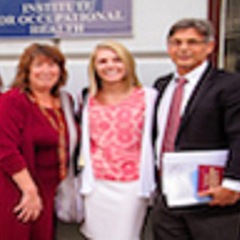
Tamara Kozyckyj, MPH Maternal and Child Health ’14, completed her practicum in Kyiv, Ukraine during the summer of 2013. As a researcher, she analyzed the association between domestic heat energy use/pollution and birth outcomes in Ukraine. She also assisted School of Public Health faculty in establishing the Global Environmental and Occupational Health Research Consortium and developed a literature review presenting best-practices in planning international research consortia.
Tamara Kozyckyj's global health experience
About Tamara's fieldwork
1. What about the Global Health Program at UIC made its greatest impact on you and how did it prepare you for a global practicum?
I loved the unique structure of our GHP core classes because they weren’t simply traditional lecture-based classes but rather an opportunity to engage in lively discussions. The learning environment was non-judgmental and the discussions generated by our course content helped me learn how to intelligently and passionately participate in discussions with opposing viewpoints on important global health issues.
2. What was the most valuable thing you learned through your global professional experience?
Flexibility, because not every country follows the same punctual work ethic we are familiar with in the United States, but don’t underestimate an individual’s quality of work or knowledge on the subject matter because of it.
3. How did this experience prepare you for work in public health?
This experience gave me the opportunity to work closely with high-level stakeholders and prepared me to confidently communicate with a diverse set of audiences including public health peers and superiors.
4. How did your perspectives or worldview change as a result of this experience?
I gained a new appreciation for the collaborative work and dedication necessary for developing and maintaining international partnerships, and also visiting Ukraine for the first time strengthened ties to my own Ukrainian heritage.
5. In what way did this experience enhance or change your career goals?
It energized me to pursue similar international collaborations or partnerships in the future and solidified my commitment to the global health and maternal-child health disciplines.
6. What advice would you give to current global health students?
Before you begin your practicum, prepare a list of objectives you’d like to achieve during your experience and share it with your preceptor so your duties closely match your expectations. However, don’t get discouraged if your objectives start to evolve or deviate from what was initially expected because these may become opportunities for more unique learning experiences.
Jiana Calixto Bio
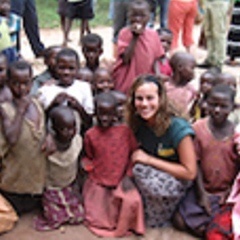
Jiana Calixto, MPH in Community Health Sciences ’15, completed her practicum in the Iganga District of Uganda in summer 2014. She worked on the Uganda Village Project as a member of a monitoring and evaluation team placed in the Kasambiika 2 village. The team implemented educational sessions on malaria, HIV/AIDS, family planning, water, sanitation and hygiene. Additionally, Jiana and her team conducted community meetings, focus groups, SWOT analyses, follow-up surveys and educational workshops. She was a recipient of the Douglas Passaro Global Horizons Scholarship.
Jiana Calixto's global health experience
About Jiana's fieldwork
1. What about the Global Health Program at UIC made its greatest impact on you and how did it prepare you for a global practicum?
The global health successes and challenges courses provided a firm foundation of understanding health on a global scale. They were some of the best courses I’ve taken at UIC SPH. Being part of the Global Health Program also gave me the opportunity to interact with fellow students, faculty, and staff that provided valuable insight on the logistics of working abroad and with a wide range of cultures. Understanding that culture, limited resources, the health care system, and so forth plays a critical role in health outcomes prepared me for adjusting to the work in rural Iganga. Furthermore, the resources offered by genuine and amazing faculty and staff in the Global Health Program aided in the entire process of finding a practicum, financial assistance opportunities, and overall preparation.
2. What was the most valuable thing you learned through your global professional experience?
The most valuable thing that I learned through my global professional experience is patience. Work abroad is very different when compared to the fast paced lifestyle of the Western world. Having patience and cultural sensitivity is key to developing a positive environment with fellow colleagues and the target population.
3. How did this experience prepare you for work in public health?
My practicum experience enhanced my skills in engaging with the community, establishing local partnerships, conducting a needs assessment, surveying techniques, and data analysis, which is extremely beneficial for work in public health. Additionally, it prepared me with the ability to work with extremely diverse teams and collaboratively develop ways to overcome challenges and barriers for global public health advancement.
4. How did your perspectives or worldview change as a result of this experience?
I did not come back to the states with the same mindset as when I left for Uganda. After living in a village without running water or electricity and high rates of diseases, health inequities across the globe have never been so striking. I’ve realized that simply providing financial assistance may not always be key to sustainable interventions, yet all key stakeholders are essential for the development process to overcoming the inequity and disparity gap. I’ve also gained a strong appreciation for other cultures and the unique ways others perceive health, life, and the world.
5. In what way did this experience enhance or change your career goals?
My global experience re-fueled my passion to work overseas and/or with migrant populations. There is something beautiful in the smiles and warmth of people, no matter their culture, race, socioeconomic status, or nationality. I plan to continue global health work and focus my efforts on increasing those smiles in coordination with improved health across the world.
6. What advice would you give to current global health students?
Finding a global health practicum may initially feel daunting, but take advantage of the resources, experiences, and opportunities offered by faculty, staff, and alumni. Pay attention to the SPH e-mails on potential global opportunities and scholarships. I would highly recommend taking the planning and evaluation, community health assessment, research methods and a global health course prior to your practicum experience. The courses that would be most helpful definitely depend on the description of your project abroad, so be mindful of your practicum goals and that of the organization you plan to work with.
Sweta Basnet Bio
Sweta Basnet, MS in Epidemiology and Biostatistics ’15, traveled to Bajura, Nepal for her fieldwork, partnering with CARE Nepal during the summer of 2014. She used a self-designed research study to measure the prevalence of sexually transmitted infection (STI) symptoms and explored the association between STI symptoms and husband migrant worker status among women. Sweta was a recipient of the Douglas Passaro Global Horizons Scholarship.
Sweta Basnet's global health experiences
About Sweta's fieldwork
1. What about the Global Health Program at UIC made its greatest impact on you and how did it prepare you for a global practicum?
The global health faculty member’s passion has made a lasting impact and inspired me to continue my global health work. I am also very appreciative of the unwavering support I received from the global health program and my peers.
2. What was the most valuable thing you learned through your global professional experience?
One of the most valuable things I learned is that people in rural areas of Nepal have been promised a lot by politicians and development organizations for many years, but not always kept the promise. The numerous women I interacted with taught me that it is important for us to keep this fact in mind and to follow through with sustainable practices and involve the community in everything I do as I continue further work in this field.
3. How did this experience prepare you for work in public health?
I was able to develop a study protocol, design a standardized survey, obtain IRB and Nepal Health Research Council approval, train research assistants, analyze the data, and write manuscripts, which have all prepared me for the work that I will be doing after I graduate. I will also be presenting my findings at global health conferences and to various stakeholder in Nepal and will work towards making evidence driven change. Interviewing women myself also allowed me to have a deeper understanding of sociocultural vulnerabilities and challenges that have yet to be addressed. Overall, this experience enabled me to apply epidemiologic skills, further my understanding of global health challenges, and identify my role as a global health epidemiologist.
4. How did your perspectives or worldview change as a result of this experience?
The field experience and the global health education I received from this program has taught me to become more critical of the global health field and the public health programs that we implement and to never undermine the voices of the community we are working with.
5. In what way did this experience enhance or change your career goals?
My experience in rural Nepal has reinforced my goal to move to Nepal to continue working to work towards improving sexual and reproductive health.
6. What advice would you give to current global health students?
I would tell students that course work alone is not enough and that it is imperative to gain global health experience. It is important to find an advisor who encourages your work and will guide you to make your goals possible. Lastly, UIC has great scholarships and nobody seeking global health experience should be deterred by the cost.
Heather Drummond Bio
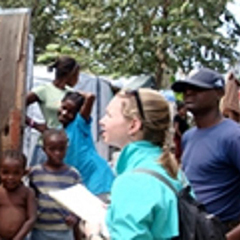
Heather Drummond, MPH in Community Health Sciences ’11, traveled to Haiti in March 2011 and worked as part of a team of public health students and physicians at an Internal Displaced Persons camp, where she focused on survey design and qualitative data analysis.
Heather Drummond's global health experience
About Heather's fieldwork
1. Where are you currently employed and what is your position?
I work at the Public Health Institute of Metropolitan Chicago, as part of the Communities Putting Prevention to Work (CPPW) program. CPPW is an obesity-prevention program sponsored by the CDC that is affiliated with the Cook County Department of Public Health. The grant is looking to prompt policy, systems and environmental change to lower obesity rates in suburban Cook County.
2. In what way did the education and training you received in the Global Health Program prepare you for your professional experience?
The Global Health Program gave me a better appreciation for the diverse audiences public health programs aim to serve. It also provided a historical context to health around the world, including the complex determinants of health.
3. What about the Global Health Program at UIC made its greatest impact on you?
The Global Health Program at UIC attracts a very diverse group of students, and the resulting discussions both in and out of the classroom enhanced my understanding of public health and fueled a passion to help others around the globe.
4. What was unique about UIC’s Global Health program?
The neighboring health sciences campus enhances the global health program; sharing the classroom with physicians and other health professional students provided a broader understanding of public health and its impact.
5. What advice would you give to current global health students?
Take advantage of all opportunities offered to you, and try and obtain global field experience by looking for practicum opportunities early!
Heather traveled to Haiti in March 2011 and worked as part of a team of public health students and physicians at an Internal Displaced Persons camp.
6. In what way did this experience enhance or change your career goals?
Having the opportunity to visit Haiti was one of the highlights of my time at the School of Public Health. Haiti is a profound example of the complexity of public health on a national scale and the corresponding challenges in assisting others to live healthy, productive lives. Haiti was both heartbreaking and truly inspiring; the people of Haiti are resolutely strong in the face of near-constant despair.
7. What was the most valuable thing you learned through your work in Haiti?
Haiti showed that providing additional funding to NGOs does not always lead to improved health. Haiti has the highest number of NGOs per capita in the world, yet the consequent weakness of the government and the lack of a formal economy keep the country stifling.
8. How did this experience prepare you for work in public health?
My experience in Haiti helped me realize that despite the inherent challenges to improving public health, the work being done is important and can make a difference. On a more practical side, my work in Haiti also gave me tangible skills in survey design and qualitative data analysis.
Chloe Polutnik Bio
Chloe Polutnik, MPH in Community Health Sciences ’13, completed her practicum during summer 2011 at Heartland Health Alliance in Chicago. She worked to promote healthy lifestyle behaviors among disadvantaged communities, particularly with refugee communities from Myanmar, Bhutan and Iraq.
Chloe Polutnik's global health experience
About Chloe's fieldwork
1. In what way did this experience enhance or change your career goals?
My experience with Heartland Alliance’s Refugee Health Programs greatly enhanced my career goals in wanting to promote healthy lifestyle behaviors among disadvantaged communities. My experience really increased my interest in refugee populations, both in refugee conditions abroad and after resettlement.
2. What was the most valuable thing you learned through this experience?
One of the most valuable things I learned was intercultural communication and cultural competency. I think this is so important when working with international populations, to really understand the people you’re working with and to make sure that what interventions you’re trying to introduce take into consideration their history and are culturally appropriate.
3. How do you think this experience will prepare you for work in the field of global health?
I gained great qualitative data collection skills. I was able to conduct interviews and focus groups with refugee women to better learn if they thought a pregnancy program was appropriate, determine what they learned, and to use this information to improve the program. It was also great to learn how to work through translators and understand language barriers that will always occur in global health settings.
4. How did your perspectives or worldview change as a result of this experience?
Before my practicum, I knew of certain refugee situations that are more highlighted in the media, but during my experience with Refugee Health Programs, I was opened up to so many refugee situations in countries I never knew had problems. It made me realize the impact of conflict and political oppression has in the lives of so many people across the globe and how this impacts their emotional and physical well-being.
5. Did this “local” experience provide you with exposure to “global” issues?
Yes, my experience in Chicago exposed me to many global issues. I realized you don’t always have to go to another country to do global health work. The refugees I primarily worked with were Burmese, Bhutanese, and Iraqi and had very different histories and cultures and different health needs.
6. What got you interested in this field of research or project?
I was first interested in refugee health after a guest speaker from Heartland Alliance spoke in one of my classes and shared what their program involves. She used a personal story from one of the health promoters who was a refugee herself and lived in a refugee camp for 16 years. I was moved by the story of these refugees who survived in these camps and now had to adjust to life in the United States, facing new barriers, including environment, language, nutrition, and navigating the health care system, that will impact their health here.
7. What is your hope for the impact of your research/work?
I hope that the data I collected to evaluate the refugee pregnancy support group will be used to further improve programs. Refugee Health Programs is starting another pregnancy and early childhood program soon. I am hoping the evaluation of the first pregnancy support group can make the new one even more culturally appropriate and address what the expecting mothers and mothers with young children really want to learn so that they can have optimal maternal health experiences in this new country.
Sara Test Bio
Sara Test, MPH in Maternal and Child Health Epidemiology ’11, traveled to Kigali, Rwanda during summer 2010 and conducted interviews with youth who are HIV positive in order to gauge sexual risk behaviors and attitudes towards condoms. She was a recipient of the Douglas Passaro Global Horizons Scholarship.
Sara Test's global health experiences
About Sara's fieldwork
1. Where are you currently employed and what is your position?
Public Affairs Specialist, CDC Kenya
2. In what way did the education and training you received in the Global Health Program prepare you for your professional experience?
The Global Health Program prepared me to broadly identify and apply community health prevention and intervention models and learn from successes and failures of past large scale programs.
3. What about the Global Health Program at UIC made its greatest impact on you?
The opportunity to learn from peers – whether Fogarty Fellows or return Peace Corps volunteers or mid-level professional returning to school – and their wealth of global health experience has influenced my understanding of the field greatly.
4. What was unique about UIC’s Global Health program?
UIC’s Global Health program offers unique opportunities to collaborate with the School of Medicine and other programs as well as foreign researchers to enrich your understanding of and technical expertise in the field.
5. What advice would you give to current global health students?
I suggest getting experience abroad designing programs and objectives, conducting assessments, and in monitoring and evaluation. Take coursework and gain practical experience in health policy, nutrition, infectious disease, HIV, maternal and child health, and disaster relief. Get involved in collaborations between the International Emergency Medicine and Health Fellows in the School of Medicine.
Sara was the recipient of a Douglas Passaro Global Horizons Scholarship. She traveled to Kigali, Rwanda during summer 2010 and conducted interviews with youth who are HIV positive in order to gauge sexual risk behaviors and attitudes towards condoms.
6. In what way did this experience enhance or change your career goals?
My experience working in Rwanda confirmed my desire to work abroad long-term in global health.
7. What was the most valuable thing you learned through your work funded by the Passaro award?
The experience taught me about the importance of partnerships and garnering local buy-in early on in project development. I also learned to ask questions and listen first before acting.
8. How did this experience prepare you for work in public health?
During my Global Health practicum, I was able to design a research study, write a proposal to the Rwandan National Ethics Committee, develop a survey instrument and focus group questions, train interviewers, supervise data collection, analyze data, present results to local staff at research forums, and a global health conference, and author a manuscript. Each of these steps built my skill base that makes me better prepared for future global health work.
9. How did your perspectives or worldview change as a result of this experience?
My field work taught me first-hand the challenges faced by adolescents, particularly young girls, to withstand financial and other pressures to engage in sex. It also increased my understanding of information exchange, particularly in a country where sex and sexual health is not discussed openly.
Kelly Schulz Bio
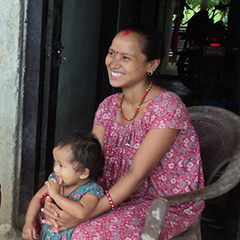
Kelly Schulz, MPH in Maternal and Child Health ’11, completed her practicum with Save the Children Nepal during the summer of 2010. She worked with Saving Newborn Lives, a program started in 2000 to address the high infant mortality rate in the country. Kelly was a recipient of a Douglas Passaro Global Horizons Scholarship.
Kelly Schulz's global health experiences
About Kelly's fieldwork
1. Where are you currently employed and what is your position?
Springhill Consulting Group; Analyst
n what way did the education and training you received in the Global Health Program prepare you for your professional experience?
My project with Save the Children in Nepal specifically prepared me for my position as I am now doing qualitative research and analysis. Both my knowledge in the health care field as well as my ability to process information and clearly present it have been invaluable assets for my current position.
3. What about the Global Health Program at UIC made its greatest impact on you?
Learning about Global Health forced me to look at the whole world rather than just the very wealthy country that I am fortunate enough to have been born in. I began to think of the economic and health disparities between the developed world and the developing world as a serious social justice issue. Second, I learned that there are so many different and beautiful cultures in the world. Respecting culture and finding a way to work with it to improve health is essential to successfully rolling out a health initiative or program.
What was unique about UIC’s Global Health program?
Some great aspects of UIC’s program are the strong passion and enthusiasm of the students as well as the presence of faculty who have actually worked in the field and are willing to help students get into the field.
4. What advice would you give to current global health students?
Figure out a way to travel to the developing world. It is worth applying for scholarships and making other sacrifices. Having the actual experience will change you as a person in ways that hours in a classroom never will. My experience in Nepal and Tanzania completely changed my perspective of the world as well as helped me to become stronger, braver, and more inspired to impact change in the world.
Kelly was the recipient of a Douglas Passaro Global Horizons Scholarship. She completed her practicum with Save the Children Nepal during the summer of 2010. Kelly worked with Saving Newborn Lives, a program started in 2000 to address the high infant mortality rate in the country.
5. In what way did this experience enhance or change your career goals?
Working in Nepal really impacted me in regard to the level of health care I wanted to work in. Previously, I considered becoming a clinician and working in direct care. However, my Passaro experience steered me towards work on a larger systems level, through policy and countrywide program implementation.
6. What was the most valuable thing you learned through your work funded by the Passaro award?
One of the important things that I learned in my work was to be flexible and patient. While I was there, I had to adjust to a not-so-strict schedule and the confusion that comes with not speaking the language. Experiencing these challenges while trying to complete a project in six weeks, was difficult, but I think that it helped me to plan efficiently and think on my feet.
7. How did your perspectives or worldview change as a result of this experience?
The change in my perspective was exemplified in a conversation that I was having with co-workers. I cited my experience in Kathmandu regarding lack of infrastructure and sanitation services, when discussing the idea of privatizing government services. One of my co-workers said, “Wow, you really have a wide range of perspectives. You are able to look at something from all angles.” I feel that the experience of working, living, and problem solving in a place that was completely out of my comfort zone has allowed me to view the world more comprehensively.
Leslie Carnahan Bio
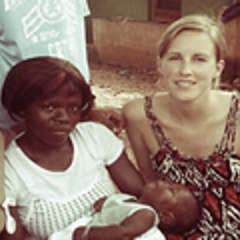
Leslie Carnahan, PhD in Community Health Sciences ’19 and MPH in Community Health Sciences ’12, completed her practicum in Ghana during summer 2011 and worked on a Millennium Villages project to address postpartum hemorrhage in women. She was a recipient of the MPH/MS Scholarship.
Leslie Carnahan's global health experiences
About Leslie's fieldwork
1. In what way did this experience enhance or change your career goals?
My practicum experience in Ghana allowed me to gain tangible and practical experience in the field of global health. I was able to apply some of the skills that I had learned during my first year in the Community Health Science program. While working in a Millennium Village, I interacted and networked with individuals from various NGOs and governmental organizations in an operations research project. Additionally, I had the opportunity to engage with local community members on the project.
2. What was the most valuable thing you learned through this experience?
The most valuable thing that I learned through this experience was to be flexible! Working in extremely rural conditions in the rainy season can lead to things that one cannot necessarily plan for, such as collapsed bridges, flooded roadways, and broken down cars. This made sticking to a “schedule” much more difficult. That being said, there were certain objectives that had to be fulfilled for the project, so the team had to think quickly and creatively almost all of the time.
3. How do you think this experience will prepare you for work in the field of global health?
This experience will prepare me for work in the field of global health because I can go to an employer and present my experience to them. Working in a global setting presents challenges that are difficult to navigate. It is important to take the time to think critically about these differences and work within different systems. Having the experience on the ground is different and I feel a prospective employer would understand and appreciate the experiences and knowledge that I gained as a student working in the field.
4. How did your perspectives or worldview change as a result of this experience?
As a result of this trip, I feel fortunate in that my worldview was broadened. This was my first trip to Africa, and it was so exciting to be in a new part of the world. When I travel, I like to prepare by reading about a country’s history, current politics, and learn a few conversational phrases so that I have a bit of a perspective before arrival. Beyond that, I try to leave as much room to soak up as many experiences as I can: food, new friends, taking public transportation, exploring the city or village.
5. What got you interested in this field of research or project?
I came to UIC SPH with the intention of gaining skills to work in global health, and particularly issues concerning women’s health. Fortunately, I was able to secure a research assistantship that focused on these interests. I worked with the Principal Investigator of the project to engage in hands-on monitoring of the research project. This trip was also a culmination of my year-long engagement with the Ghana project. Because of this, I had a vested interest in the project and had already formed relationships with the global team.
6. What is your hope for the impact of your research?
Ultimately, my hopes for the impact of the research that I took part in, is that the health of women in low-resource rural settings is improved, specifically by preventing postpartum hemorrhage (PPH) after childbirth. Women in these settings have poorer health outcomes and bear the burden of the majority of maternal mortality in the world. It is my hope that this work will provide a basis and model for preventing deaths and ultimately reduce maternal mortality ratios in low-resource countries where many women continue to deliver in their homes without a skilled attendant.
Rebecca Duerst Bio
Rebecca Duerst, MPH ’12, traveled to Hyderabad, India during summer 2011, where she worked to address family planning issues, provide immunization services, update vaccination data and conduct research related to diphtheria vaccination. Rebecca was a recipient of the Douglas Passaro Global Horizons Scholarship.
Rebecca Duerst's global health experiences
About Rebecca's fieldwork
1. In what way did this experience enhance or change your career goals?
My experience in India was the first opportunity I had to work in the field of global health. I learned so many valuable lessons that I will carry with me into my future career. After I graduate, I hope to work long-term in developing countries, and this experience solidified the direction in which I would like my career path to take
2. What was the most valuable thing you learned through this experience?
I learned the value of working with members of the local community and trusting in their ability to get things done and get them done well. When conducting research in other countries, it’s important to let the local people take the lead and have the final say in the research process.
3. How do you think this experience will prepare you for work in the field of global health?
This experience gave me a very positive first taste of working in the field of global health. It has helped prepare me for a future career by giving me a firsthand understanding of the health issues that are faced in developing countries and strategies to overcome these issues.
4. How did your perspectives or worldview change as a result of this experience?
Working in India has made me even more aware of the benefits of working with people who are different from us. When we use everyone’s unique abilities and contributions, we can make positive changes that are relevant and sustainable.
5. What got you interested in this field of research or project?
I have always been interested in vaccine-preventable diseases; I used to do basic laboratory research in vaccine development. After serving as a volunteer teacher in Namibia for two years, and meeting so many people with diseases that could have been prevented, I decided to go into global health with a focus on infectious disease.
6. What is your hope for the impact of your research?
India has the highest number of diphtheria cases in the world. We are hoping that with a better understanding of people’s knowledge and beliefs about diphtheria and diphtheria vaccination, we will be able to develop educational material that will improve vaccination rates and prevent the spread of diphtheria in India.
Lauren Hooberman Bio
Lauren Hooberman, MPH ’12, completed her practicum in Tel Aviv, Israel during summer 2011, where she worked on a project to address Thai migrant workers’ exposure to pesticides. Lauren was a recipient of the Douglas Passaro Global Horizons Scholarship.
Lauren Hooberman's global health experiences
About Lauren's fieldwork
1. In what way did this experience enhance or change your career goals?
While many of my peers went to developing countries, I had a different experience in Israel. I lived in Tel Aviv, a modern metropolis, but I also had an opportunity to go on site visits at various farms (moshavs and kibbutzes) throughout the country. The opportunity to conduct public health work in an international setting was invaluable. I feel more confident about pursuing global health work opportunities in a variety of settings after I graduate.
2. What was the most valuable thing you learned through this experience?
I used a combination of different approaches and strategies. I often had to be resourceful, persistent, and patient while conducting field work. I learned firsthand the difficulties of working in a setting in which language barriers exist.
3. How do you think this experience will prepare you for work in the field of global health?
This experience will prepare me for work in global health because I have a better idea of what to expect and how to address challenging situations. While I was working on a worker safety project to address migrant workers’ exposure to pesticides, an area which was new to me, I drew upon skills that I learned in my courses at UIC.
4. How did your perspectives or worldview change as a result of this experience?
Despite having visited Israel in the past, I was unaware of the Thai migrant population in Israel. This experience allowed me to see firsthand the difficulties these workers faced in their daily lives, due to isolation, language barriers, and their status as migrant workers. By gaining exposure to these issues, I developed an understanding of the complexity of international laws and policies and the ways in which they impact migrant worker populations.
5. What got you interested in this field of research or project?
I had assistance in identifying this project from several SPH faculty members. I am interested in the area of health and human rights and this project was a good fit.
6. What is your hope for the impact of your research?
The research that I conducted during my practicum is part of a larger ongoing public health project in Israel. The long-term goal of the migrant worker project is to create legislation to mandate migrant workers’ basic job training in a language they can understand, as well as mandating the use of personal protective gear in the field.
Katherine Heiman Bio
Katherine Heiman, MPH in Epidemiology ’09, completed her practicum in 2008 with Concern America in Guatemala. She traveled to different sites to learn about aspects of health in rural populations, including access to care and treatment and surveillance of infectious diseases. Katherine was a recipient of the Douglas Passaro Global Horizons Scholarship.
Katherine Heiman's global health experiences
About Katherine's fieldwork
1. Where are you currently employed and what is your position?
Surveillance Epidemiologist , National Center for Emerging and Zoonotic Infectious Diseases, Centers for Disease Control and Prevention
I focus on surveillance of and epidemiologic analyses of enteric pathogens, including Shigella and Shiga toxin-producingEscherichia coli, and investigate multistate clusters of Shigella and Listeria monocytogenes, and other enteric pathogens.
2. What about the Global Health Program at UIC made its greatest impact on you?
The sense of community within the program and the global health student interest group. It was inspiring to learn from and work alongside others with such diverse experiences and interests.
3. What advice would you give to current global health students?
Take advantage of every opportunity presented to you, and use your time in graduate school to explore all your interests.
Katherine was the recipient of a Douglas Passaro Global Horizons Scholarship. She completed her practicum in 2008 with Concern America, in Guatemala. Katherine traveled to different sites to learn about aspects of health in rural populations, including access to care, treatment of and surveillance of infectious diseases.
4. In what way did this experience enhance or change your career goals?
My Passaro experience in Guatemala ignited my interest in global health and laid the foundation for other global health projects I undertook while in school. I hope to be more directly involved in global health in the future.
5. What was the most valuable thing you learned through your work funded by the Passaro award?
An appreciation for the complex issue of access to affordable health care and treatment.
6. How did this experience prepare you for work in public health?
Working in the field and learning about Guatemala’s health systems firsthand provided an understanding and knowledge that is difficult to obtain in the classroom. I learned a lot of practical lessons, about challenges and successes in implementing community-based health programs in a low resource environment. Through conversations with persons in different indigenous populations, I also learned about the civil conflict and its indirect and direct impact on health. I feel that these broader social economic issues are relevant to all aspects of public health.
7. How did your perspectives or worldview change as a result of this experience?
My time in Guatemala shifted my thinking about health in general, and gave me a better understanding of some of the complex challenges and vast disparities that exist at home and abroad.